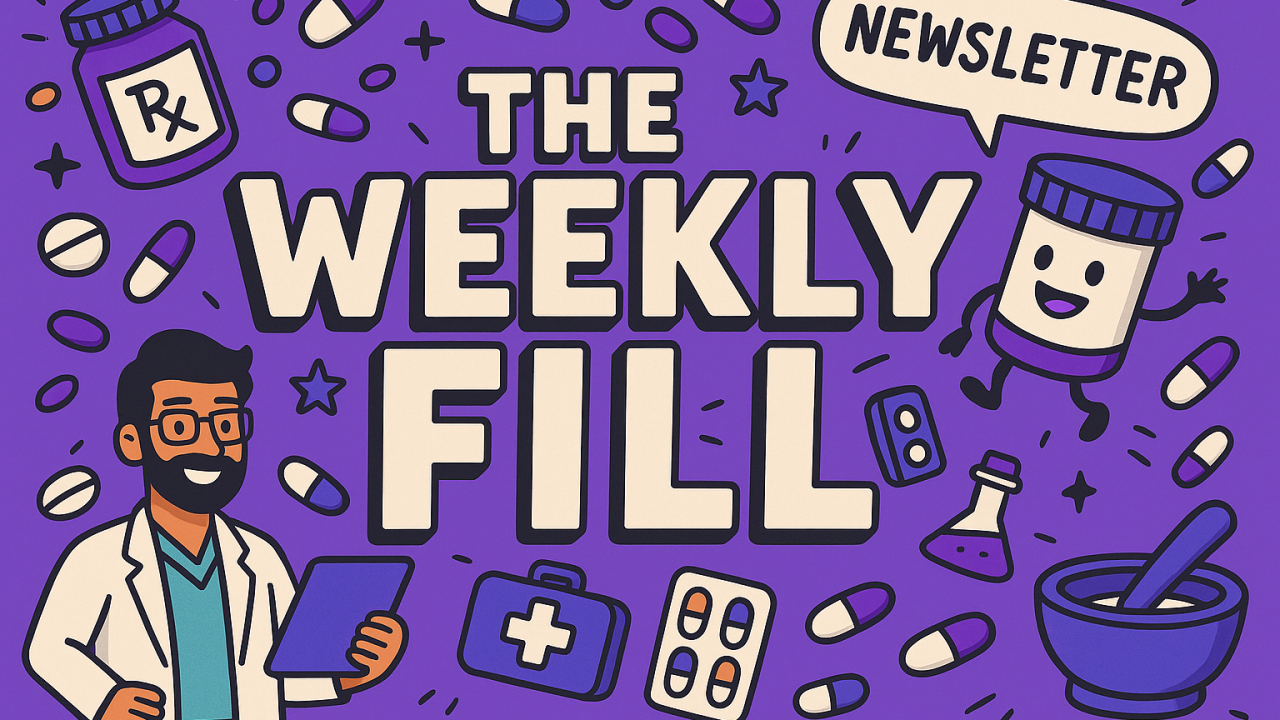The Weekly Fill is your go-to for pharmacists, pharmacy techs, owners, operators, managers, you name it. If you’re in pharmacy, this newsletter is for you. 🫡
Authored by Matthew Giroux, PharmD Candidate
The Big Weekly Fill:
Medication Order Autoverification: New Guidance from ASHP
What’s happening?
ASHP’s Section of Inpatient Care Practitioners Work Group released updated guidance on medication order autoverification, a growing trend where certain orders bypass manual pharmacist review and are verified automatically by the system.
Why does it matter?
Autoverification can streamline workflows, reduce medication administration delays, and improve efficiency. But without safeguards, it can expose patients to unnecessary risk, particularly with high-alert or complex therapies.
Key points from the guidance:
Autoverification ≠ autopilot: Institutions must define which orders qualify for autoverification and which require manual review.
Risk stratification is essential: High-alert meds, weight-based dosing, and pediatric/neonatal orders are generally not appropriate for autoverification.
Pharmacy-led governance: Autoverification policies should be designed and overseen by pharmacists, not left solely to IT or system vendors.
Audit and feedback loops: Continuous monitoring, error tracking, and periodic policy updates are critical for safe implementation.
Takeaway for pharmacy leaders:
Hospitals adopting autoverification must balance efficiency with clinical oversight. Pharmacist engagement in designing, monitoring, and refining these systems is essential to safeguard patient care.
You can read the full journal article here
📊 Industry Trend:
Legislative Spotlight: ECAPS & 340B Bills
What new info surfaced?
- The Ensuring Community Access to Pharmacist Services Act (ECAPS) was introduced in Congress to grant pharmacists additional authority under Medicare Part B for services like testing, treatment, and vaccinations for common infectious diseases (flu, RSV, COVID-19, strep throat), only in states where such pharmacist services are already allowed under state law.
- ECAPS would essentially make permanent several COVID-era flexibilities that allowed pharmacists to deliver certain public-health services, and crucially, ensure those services can be reimbursed under Part B.
- On the 340B side, the 340B PATIENTS Act aims to strengthen the original intent of the 340B program by clarifying that manufacturers cannot impose restrictions on contract pharmacy arrangements, and must offer the statutory 340B discount to eligible covered entities regardless of where or how the drug is dispensed.
- The bill also includes civil monetary penalties for manufacturers who violate these requirements, reflecting concern that recent manufacturer policies are undermining access to the 340B benefits, particularly for safety-net providers and vulnerable populations.
Why it matters for pharmacists & health systems
- If ECAPS passes, pharmacists in many states will have greater scope to support primary health efforts (easier, faster access) and will have reimbursement potential under Medicare Part B, which could expand pharmacy services and help relieve burden on other parts of the healthcare system.
- For rural and underserved areas, ECAPS could help fill care gaps—pharmacies already often serve as frontline access points, and this could formalize and support that role.
- With the 340B PATIENTS Act, preserving contract pharmacy access ensures that covered entities (hospitals, clinics, etc.) can maintain broad access to discounted drugs. Losing or having restrictions imposed reduces their ability to stretch funding, support clinical services, and deliver care to vulnerable populations.
- Penalties for manufacturers and clearer legal requirements may shift the power balance, possibly forcing compliance or triggering legal challenges, depending on how strictly manufacturers enforce restrictive policies now.
Read more here
🗞 Quick Scripts: Other Industry News
Pharma Manufacturing Investments (GSK & Lilly):
Big Pharma is betting on U.S. soil. GSK and Eli Lilly are committing billions toward new manufacturing plants, R&D hubs, and supply chain facilities across the U.S. These investments are partly driven by looming tariff threats and growing pressure to reduce reliance on overseas production. While job creation and a stronger domestic supply chain are the promises, it will take years before patients and pharmacies feel the impact. Read more here
Drug Shortages Still Looming:
A new report from AMCP signals trouble ahead: over 60% of experts predict active drug shortages will climb by at least 25% within the next five years. For pharmacies, this could mean more juggling of inventory, increased reliance on therapeutic substitutions, and tougher conversations with patients. Costs, safety, and patient satisfaction may all take hits if solutions don’t arrive soon. Read more here
FDA Transparency Push:
The FDA is pulling back the curtain on how and why drug approvals stall. Complete Response Letters (CRLs), which explain why an application was denied or delayed, will now be more accessible to the public. The agency is also launching a “Green List” to protect patients from illegal GLP-1 imports, a hot market for counterfeits. Together, these changes aim to boost trust, improve provider decision-making, and protect patient safety. Read more here
Drug Spotlight:
Lenacapavir (Sunlenca®)
YEZTUGO is a long-acting HIV-1 capsid inhibitor, now approved for PrEP in adults and adolescents weighing at least 35 kg. It works by disrupting the HIV capsid at multiple points in the viral life cycle, blocking replication. The regimen begins with an oral and injectable initiation phase, followed by a subcutaneous injection every six months, with an oral “bridge” option if injections are delayed. Trials (PURPOSE 1 & 2) included one of the most diverse PrEP study populations to date, showing strong preventive efficacy. Common adverse effects include injection-site reactions, headache, and nausea, with a boxed warning for resistance risk if used in undiagnosed HIV infection.
Why it matters: Unlike daily oral PrEP, lenacapavir is delivered as a twice-yearly subcutaneous injection. This significantly reduces the adherence barrier and could reshape HIV prevention strategies, especially for high-risk groups who struggle with pill fatigue or face stigma.

